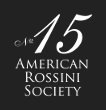Scott, Tottola, and Rossini, the “Fathers” of La Donna del Lago.

Sir Walter Scott’s narrative poem,”The Lady of the Lake” was published in 1810. It quickly became very popular, so much so that when the American abolitionist, Frederik Douglass escaped from slavery in 1836, he adopted his new surname from the protagonist of Scott’s poem!
Rossini became aware of the poem through a French translation which had been brought to his attention before the first Italian translations appeared.
Transforming Scott’s poem into a libretto was achieved by Andrea Leone Tottola, Rossini’s literary collaborator, in 1819. Tottola’s importance should not be underestimated. Giovanni Carli Ballola writes in the program book for the 2001 Rossini Opera Festival that “ the task, by no means simple, of converting Scott’s poem into dramatic form was undertaken and solved with the highest degree of craftsmanship and integrity, taking also into consideration those suggestions of the composer’s that modern musicology takes for granted.”
Ballola continues “ There is, in fact, no vital strand of Scott’s tale that is not substantially respected in the libretto, from the plot, the weight given to each character and his interaction and conflict with the others, the moral of the story, to the strongly characterized atmosphere of the setting,..sometimes the strands are even stressed.”
Furthermore, Balllola credits Tottla with managing to avoid wandering away from the point ( in the second act) by the “ingenious idea of planning a very extended music number, the trio for Elena, Uberto, Rodrigo, and chorus, which concentrates the dramatic tensions of the plot like storm clouds then having them burst in a catastrophe”
Undoubtedly Rossini was very much a part of this process, but Tottola’s contribution deserves more recognition.
In view of this, how much of Scott remains in this opera? Enough, apparently to raise the hackles of the Sir Walter Scott Club in connection with a recent production of this opera by John Fulljames at Covent Garden.
The Herald of Scotland, reporting on the dispute recounts that the row started when Fulljames said:
“Turning Highlanders into savages is the clear choice of an author; that’s what Rossini and Scott are saying. They are saying that these people cannot be taken into modernity.”
According to the Herald, Fulljames was influenced by films like “Highlander and Braveheart: “If you look at those films, the Highlanders are hairy. You do imagine they’d be smelly.”
Professor David Purdie of Edinburg University and chairman of the Sir Walter Scott Club retorted: “Everyone was smelly in the 18th century. This is all before any personal odour cologne.”
More seriously, Professor Purdie points out ;”Scott was a great admirer of the courage and characteristics of the Highlanders and lamented the fact they had been separated for so long from southern Scotland by geography, language, politics and religion….. His great aim in life was the promotion of Scotland as a unity withing the United Kingdom.”
Rossini has the last word in this dispute. There is nothing savage or ugly in this music, so the audience is left to draw its own conclusions.
